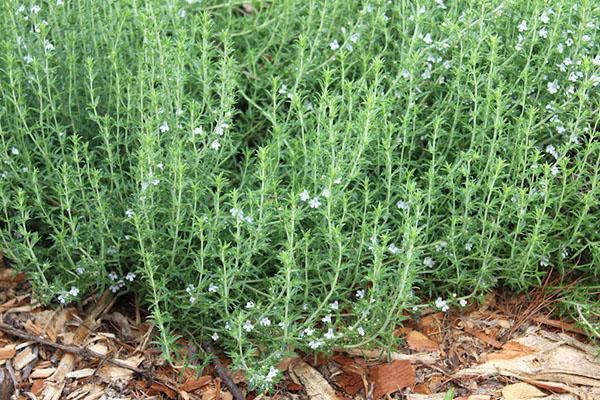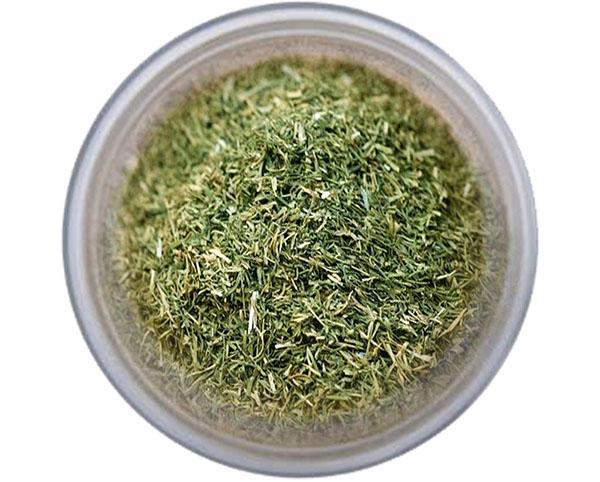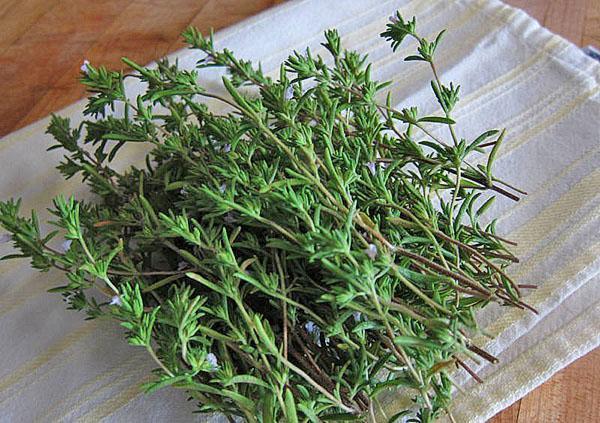How to use the medicinal properties of savory and contraindications to its use
 Savory is popularly called pepper grass. It is necessary to know the medicinal properties of savory and contraindications to its use for successful use for your health. This plant grows independently in the wild in the mountains and meadows. People cultivate this culture especially on their personal plots for decorative and recreational purposes. The sharp taste and tart aroma allowed this spice to enter many cuisines of the world. The culture is widely used in folk medicine as a disinfectant, pain reliever, tonic and anti-inflammatory agent. Savory treatment should be carried out in strict accordance with the dosage, for a limited time.
Savory is popularly called pepper grass. It is necessary to know the medicinal properties of savory and contraindications to its use for successful use for your health. This plant grows independently in the wild in the mountains and meadows. People cultivate this culture especially on their personal plots for decorative and recreational purposes. The sharp taste and tart aroma allowed this spice to enter many cuisines of the world. The culture is widely used in folk medicine as a disinfectant, pain reliever, tonic and anti-inflammatory agent. Savory treatment should be carried out in strict accordance with the dosage, for a limited time.
Why savory is useful, its composition

Savory contains:
- mineral salts;
- carotene;
- ascorbic acid;
- antioxidants;
- tannins;
- phytoncides;
- resins;
- mucus and bitterness;
- 10 essential oils;
- vitamins A, PP, group B;
- iron, zinc, copper.
In the human body, carotene is involved in the synthesis of vitamin A, which is a strong antioxidant, improves vision, strengthens the immune system, and increases skin elasticity. Due to its astringent properties, the plant has a bactericidal and anti-inflammatory effect. Thanks to vitamins, it normalizes blood composition and helps to resist infections. Essential oils normalize the nervous system. Bitterness helps to eliminate parasites.
Where and how savory is used
 The medicinal properties allow the use of savory in folk medicine. They are treated for cystitis, tachycardia, angina, bronchitis, indigestion and intestinal disorders, gum disease, toothache and joint pain, colic. On the basis of dry and fresh raw materials, useful decoctions and infusions are made, rubbing with essential oil is carried out.
The medicinal properties allow the use of savory in folk medicine. They are treated for cystitis, tachycardia, angina, bronchitis, indigestion and intestinal disorders, gum disease, toothache and joint pain, colic. On the basis of dry and fresh raw materials, useful decoctions and infusions are made, rubbing with essential oil is carried out.
Savory herb is in demand in cosmetology. The plant stimulates the regeneration of skin cells, therefore it is used to prepare masks and lotions. On its basis, restoring hair products are made. They help to strengthen the hair follicle, protect hair along its entire length, and improve the appearance of the hairstyle.
 Savory is widely used in cooking. The taste of fresh herbs is bitter, reminiscent of hot peppers. It is added to salads and sauces, served with soups and side dishes. Dry spice adds spice to meat and fish dishes, goes well with cereals, vegetables, legumes, mushrooms... It goes well with other spices and is used in home canning.
Savory is widely used in cooking. The taste of fresh herbs is bitter, reminiscent of hot peppers. It is added to salads and sauces, served with soups and side dishes. Dry spice adds spice to meat and fish dishes, goes well with cereals, vegetables, legumes, mushrooms... It goes well with other spices and is used in home canning.
The herb kills bacteria, so salting not only acquires an exquisite taste and aroma, but also keeps much longer.
The healing properties of savory
 Savory is used to treat many disorders and diseases. It has astringent, anthelmintic, expectorant, bactericidal, tonic, anti-inflammatory effect, is a diuretic and antispasmodic.
Savory is used to treat many disorders and diseases. It has astringent, anthelmintic, expectorant, bactericidal, tonic, anti-inflammatory effect, is a diuretic and antispasmodic.
Savory and thyme are different herbs, although they belong to the same labiate family.
Savory - medicinal properties and contraindications:
- It has a diuretic and diaphoretic effect, effectively lowers blood pressure.
- When coughing, it activates the production of sputum, facilitates its removal from the respiratory tract.
- It is used as an antidepressant, as it has a calming effect on the nervous system.
- Lowers cholesterol and blood sugar levels, helps to stabilize these indicators.
- Increases male and female libido, enhances potency, normalizes hormone production.
- The spicy spice savory stimulates appetite, normalizes gastric secretion.
- Stops vomiting, helps with flatulence and bloating, improves intestinal microflora.
- Tones up, increases efficiency, stimulates brain activity, provides a surge of energy and strength.
- With insect bites, it has a cooling and analgesic effect, relieves itching and swelling.
- Restores cartilage tissue, is used in the treatment of arthritis, arthrosis, neuralgia.
- It has a detox effect on the body, removes toxins and toxins, cleanses and regenerates the liver and kidneys.
- Savory infusion is used to rinse a sore throat, eliminate toothache, relieve gum inflammation.
Simple and effective recipes
 The use of savory in cooking and medicine is carried out in a fresh and dry state. For the preparation of medicinal raw materials, ground parts of the plant, inflorescences are used.
The use of savory in cooking and medicine is carried out in a fresh and dry state. For the preparation of medicinal raw materials, ground parts of the plant, inflorescences are used.
Notable recipes:
- From worms. Brew a spoonful of dry herbs in a glass of boiling water. Children and adults drink a tablespoon every 2-3 hours.
- Throat rinse solution. Dried savory 30 g to insist for 20 minutes in 200 ml of boiling water. Strain, rinse before meals.
- From bites. Wipe damaged areas with plant juice, apply green leaves.
- For immunity, against colds. Brew directly in a cup, drink instead of tea. For 150 ml, a teaspoon of dry or fresh herbs is enough.
- Healing baths. Add savory essential oil to a hot bath, carry out the procedure for 10-15 minutes. It helps against skin diseases and neuralgic diseases.
- To lower blood pressure. Drink freshly brewed tea with savory; a pinch of herbs is enough for one cup. The pressure should return to normal.
- With fungal infections. Lotions are applied to the skin and mucous membranes, in parallel, the broth is taken internally 3-4 times a day. Treatment is carried out in a course of 1 month.
- To the wounds. Promotes healing of open wounds, erosions and ulcers, stops bleeding. At the site of damage, you should simply apply gruel from fresh savory herbs.
What is known about the spice savory
 Dried savory is a part of ready-made spice mixtures. Among them are Provencal herbs, Khmeli-suneli, Sharena salt. They are added to meat, fish, soups, dressings, sauces, breading. The spice should be used in moderate doses and added at the very end of the process so that the bitter taste does not overwhelm the rest of the flavors of the dish.
Dried savory is a part of ready-made spice mixtures. Among them are Provencal herbs, Khmeli-suneli, Sharena salt. They are added to meat, fish, soups, dressings, sauces, breading. The spice should be used in moderate doses and added at the very end of the process so that the bitter taste does not overwhelm the rest of the flavors of the dish. Savory is known by different names in different countries. In Bulgaria - chubritsa, in Moldova - chimbru, in the Caucasus - citron, in Uzbekistan - dzhambul, in Georgia - kondari. It is added in the preparation of a wide variety of dishes; tea is brewed with this herb. A fragrant seasoning can enrich the taste and aroma of any vegetable oil. For this, several green or dry twigs are placed in a container with oil.
Savory is known by different names in different countries. In Bulgaria - chubritsa, in Moldova - chimbru, in the Caucasus - citron, in Uzbekistan - dzhambul, in Georgia - kondari. It is added in the preparation of a wide variety of dishes; tea is brewed with this herb. A fragrant seasoning can enrich the taste and aroma of any vegetable oil. For this, several green or dry twigs are placed in a container with oil.
What are the limitations
 The medicinal properties of savory and contraindications depend on the dosage and timing of use. Herbal treatment is not recommended during pregnancy and lactation. The plant can harm in case of violations of the functions of the gastrointestinal tract, secretion organs, heart failure. Exceeding the permissible dose can provoke an exacerbation of thyroid disease. Savory oil is not applied before sun exposure, as it increases the effect of ultraviolet radiation on the skin and can cause burns.
The medicinal properties of savory and contraindications depend on the dosage and timing of use. Herbal treatment is not recommended during pregnancy and lactation. The plant can harm in case of violations of the functions of the gastrointestinal tract, secretion organs, heart failure. Exceeding the permissible dose can provoke an exacerbation of thyroid disease. Savory oil is not applied before sun exposure, as it increases the effect of ultraviolet radiation on the skin and can cause burns.
 Has useful properties garden savory and wild. The herb is used in a healthy diet both dry and fresh. Herbal treatment is always carried out in accordance with the recommendations of knowledgeable people, in compliance with the terms and special instructions.If an allergic reaction is noticed, then you should stop using this herb.
Has useful properties garden savory and wild. The herb is used in a healthy diet both dry and fresh. Herbal treatment is always carried out in accordance with the recommendations of knowledgeable people, in compliance with the terms and special instructions.If an allergic reaction is noticed, then you should stop using this herb.